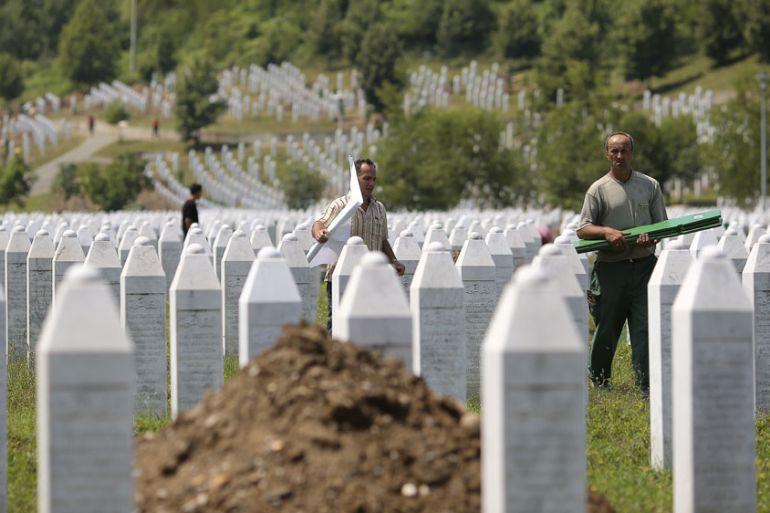Top UN court delivers Balkan genocide verdicts
International Court of Justice handing down verdicts in a case that could reopen wounds between Serbia and Croatia.

The UN’s highest International Court of Justice is handing down its rulings in a long-running genocide case, seen as a landmark decision that could reopen wounds between former foes Croatia and Serbia.
ICJ chief judge Peter Tomka was reading the verdicts at the court’s headquarters in The Hague’s Peace Palace on Tuesday in a case described by Serbian Foreign Minister Ivica Dacic as “perhaps one of the most important events for our bilateral relations with Croatia”.
Keep reading
list of 4 itemsCan international justice stop Israel?
What will be the outcome of the ICJ genocide case against Israel?
Is Israel committing genocide in Gaza?
Zagreb in 1999 dragged Belgrade before the ICJ on genocide charges relating to Croatia’s war of independence that raged between 1991 and 1995 following the collapse of the former Yugoslavia.
This will be one of perhaps the most important events for our bilateral relations with Croatia.
Serbia was accused of ethnic cleansing as a “form of genocide” at the time, leading to large numbers of Croats being displaced, killed or tortured and their property being destroyed.
Some 20,000 people died in the conflict, one of several to shake the Balkans in the 1990s.
Zagreb also wants judges to order Belgrade to pay compensation for damage “to persons and properties as well as to the Croatian economy and environment … a sum to be determined by the court”.
Belgrade responded with a counter-suit in 2010, saying some 200,000 ethnic Serbs were forced to flee when Croatia launched a military operation to retake its territory.
Following Zagreb’s counteroffensive, called Operation Storm, the proportion of ethnic Serbs in the area dwindled from 12 percent to 4 percent.
Belgrade was outraged in 2012 when Operation Storm’s Croatian military commander, Ante Gotovina, was acquitted on appeal before The Hague-based International Criminal Tribunal for the former Yugoslavia (ICTY).
Genocide hardest to prove
So far the ICJ, which rules in disputes between states, has recognised only one genocide case since opening its doors in 1946.
Genocide is the most serious of international crimes but also the hardest to prove.
In 2007, the court ruled that genocide had taken place in 1995, at Srebrenica in neighbouring Bosnia, when almost 8,000 Muslim men and boys were slaughtered and their bodies dumped in mass graves by Bosnian Serb troops that overran a UN-protected enclave.
Both Belgrade and Zagreb said they would accept the verdict in the 15-year-old case.
Croatian Justice Minister Orsat Miljenic did not want to speculate, but has said before that Zagreb’s main goal was to “present what happened in the war and that was aggression against Croatia”.
“Expectations have already been met,” through the case being presented at the ICJ, Miljenic added.
Serbian Foreign Minister Ivica Dacic said at a press conference in Belgrade on Sunday: “This will be one of perhaps the most important events for our bilateral relations with Croatia.”
“It will probably be the end of a process that has lasted for 15-20 years [and] will put an end to both sides’ fight to prove who the worst criminal is.”
“Maybe we’ll have an opportunity to leave the past behind and turn towards the future,” Dacic said.